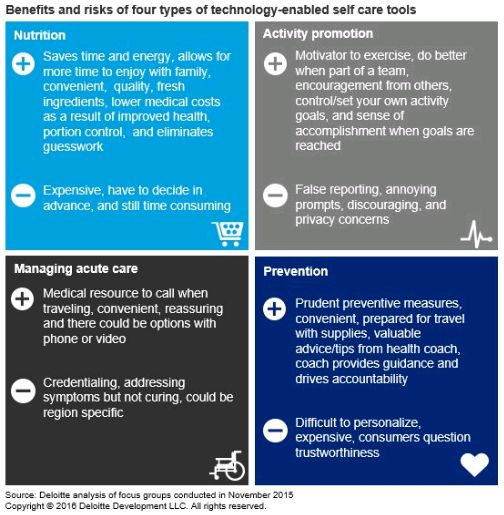This week we're delighted to share an article written by Harry Greenspun: MD, Director – Deloitte (US) Center for Health Solutions. In his 'My Take', Harry explores the potential for consumers to adopt new technologies which bring healthcare closer to home:
I embrace technology to the point that my home mirrors the International Space Station. I can remotely adjust its systems, assess its inhabitants (both two- and four-legged), and order supplies that are unlikely to be obtained if not delivered right to my house.
Whether driven by convenience, cost, or safety, all of these capabilities have been transformative. I can set or adjust elaborate temperature zones, lock or unlock doors, control alarms and appliances, and see who my dog Tarot is barking at. I also can tell when people arrive and leave and locate my kids.
The house isn't the only thing I monitor – I can also assess my family's health. All of us have wearable devices that monitor our exercise, providing extensive data on routes and performance. Even Tarot has one, helping us determine if he has had enough activity during the day to sleep well at night. Groceries and other household goods get delivered on schedule based upon our historic usage, which helps us make better eating decisions the more we order healthy food.
All of these innovations have given us a level of insight and capability we could not have imagined even a few years ago. At the same time, each raises privacy concerns.
So why do we do it? Because we get something out of it.
As technology continues to advance, an increasing number of health care services traditionally provided in a hospital or physician's office will be available in the home. One question remains, "How quickly will consumers adapt and accept new technologies that bring care into their home?" This is the question the Deloitte Center for Health Solutions explored in Technology-enabled home health: Are consumers ready? Through a series of focus groups, our researchers sought to better understand consumers' opinions about health care outside of traditional settings and the technology that may support bringing it into the home.
The study looked at consumers' views of using tech-enabled home health solutions to manage chronic conditions, including self-care, clinical data transmission, interaction between healthy or unwell patients and their care teams, and personalized reminders about diet and exercise. In general, consumers are optimistic about using technology to facilitate home health care.
However, consumers raised some concerns about how technology tools would affect their privacy. Less-intrusive sensors that offer benefits, like stove burner controls or fall detection, are welcome. But, sensors that monitor an individual's sleep quality, motion patterns at home, or bathroom usage face more resistance. After participants discussed and learned about some of the clinical justifications for these sensors, many of those who opposed often reconsidered their original views.
As more care moves to self-care, consumers want to have influence and control over their health information and journey. The consumers we talked to seemed to have sophisticated opinions about using technology-enhanced tools to promote healthy living. They saw benefits and risks from technology-enabled self-care in the four broad categories of nutrition, physical activity, prevention, and dealing with an acute episode.

For example, the participants in the focus groups generally favored the concept of ready-to-cook ingredients for healthy meals. Like me, many people find themselves without the time to plan meals, go to the store to find all of the ingredients, and then prepare them at home. Most people would prefer to eat healthier, and many like the idea of making it easier and more convenient to do that.
Many of the participants felt positively about using devices to monitor physical activity. However, some consumers, particularly women and individuals age 45-64, often feel discouraged after seeing how they compare to others. Using health coaches to encourage the use of preventive services like vaccines and health screenings received mixed reviews from the focus groups. Some of our respondents said they would find it helpful, while others said they would feel like they just got another person that would nag them about things they already knew they should be doing.
Finally, when managing acute needs, many of the participants liked the idea of using telemedicine options – particularly when traveling. A few expressed concerns about not knowing the credentials of a new telemedicine doctor and said they would rather use telemedicine services through a doctor they already had a developed relationship with.
Though consumers are open to adopting new technology, they have some reservations. Successful technology-enabled home health care may depend on sustained consumer and provider engagement. Companies interested in moving into home health will need to acknowledge the personal nature of health care and work to improve communication between stakeholders (i.e., share fitness and home-monitoring data with providers), acknowledge the evolving models of care teams, and note that different consumer segments use technology differently and that consumer engagement will be key to success in the home health model.
As I get older, I expect to leverage technology to support my health in the same way that I use it now to support my home and fitness. Through biosensing wearables and other in-home monitoring devices, I hope to have a clear view into changes in my health and enjoy tools that support me in caring for any condition I might have, automate scheduling, and deliver necessary drugs and services. And, as the nature of the information being shared becomes more personal, I will also expect a much higher level of care and convenience in order to make the privacy trade-off worthwhile.
The content of this article is intended to provide a general guide to the subject matter. Specialist advice should be sought about your specific circumstances.

